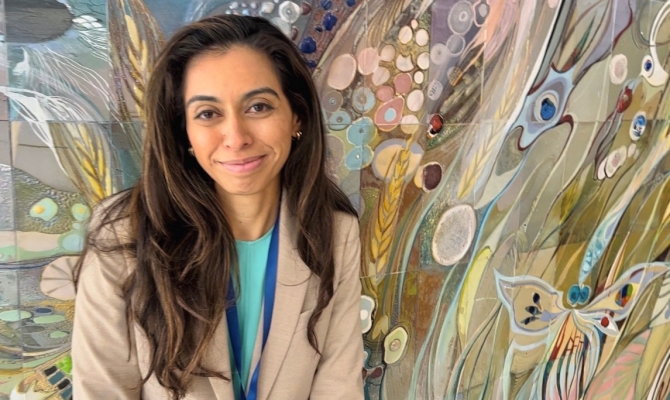Q and A with Ambassador Ilana Seid, Permanent Representative of Palau to the UN and Chair of Pacific Small Island Developing States
Nearly 200 countries met in Paris last week to negotiate one of the most consequential international multilateral environmental agreements of our time.
The second session of the Intergovernmental Negotiating Committee to develop an international legally binding instrument on plastic pollution, including in the marine environment (INC2) was in its final day of deliberations after initial delays over procedural matters.
Fourteen Pacific Small Island Developing States (PSIDS) have called for a treaty that is ambitious from the start, captures the entire lifecycle of plastics and has mandatory measures to end plastic pollution by 2040.
We spent time with Ambassador Ilana Seid, the Permanent Representative of Palau to the UN and current Chair of Pacific Small Island Developing States to get her views on last week’s meeting.
Q: Thank you Ambassador for your time, let’s begin by sharing your thoughts on the progress in negotiations so far?
A: “This week has been interesting, two and half days were taken up by procedural issues, but we got through that kind of static phase and then we were able to have substantive conversations the last two days. The objective of INC2 is to get a zero draft for INC3 and I’m optimistic that we can get that done. There is a lot of differing views for sure and that was to be expected but it’s great that there’s been a lot of engagement. A lot of the member states are putting in ideas, views and concerns and people are listening. This INC is a great stepping stone to get to the next one.”
Q: The Pacific has been commended on being united and loud in their call for ambitious target. How do you think the Pacific has done so far?
A: “The Pacific has done a tremendous job. I’m very proud of our team. Plastic pollution is one of the major concerns for our region, especially for the Pacific Small Island states. We came and we made it known that this is a problem that needs to be addressed for the world and specifically for the marine environment, which is littered with a lot of legacy plastics. Our team has done a fantastic job and I commend everyone, including the CROP agencies and our expert advisors. Teamwork makes the dream work and we’ve made a really good process to have our voices heard.
Q: Do you think the Pacific positions and concerns will be included in the zero draft?
A: Yes, absolutely. We were unified as a region, and we got our voices heard, in particular the specific language around the marine environment which we hammered over and over. We told stories about why the world needs to act and why it’s very important to us. We, Pacific Islanders are ocean people and view ourselves as the custodians of the Pacific Ocean. This is not just for the benefit of ourselves, but also for the international community, which relies on the Pacific region for the majority of the global seafood trade, including 60% of the global tuna trade. We really want to work together to address this problem.
Q: Do you think we will get a zero draft?
I hope so. I’m optimistic but it’s not over yet. Given that we were able to get through the two contact groups, deliberations of which went late into the night, this should give the secretariat enough to at least give us something. It’s not over till it’s over.
Q: So what lies ahead from now till INC3?
A: We have a lot of work to do. We now know based on the interventions from a lot of member states where the disparities lie. We’ll have to get a lot more experts involved to help inform our policy decisions and our positions. People who are experts in chemicals, in packaging material, people who are experts in environmental treaties etc. Now that we’ve had the read of the room and we know how things are shaping up, we go and we find people to help us try to shape those conversations.
Q: Finally, do you have any memories of your first international negotiation?
A: It was at the Glasgow COP, the Pacific was very strong in trying to push for mandatory partial cancellation under Article 6, which is a global carbon market rulebook. We were fought by more or less everyone in the room but we said will not be leaving without it. That’s when I knew that the Pacific and small Islands in general when we act together, we can change global policy. That gave me a lot of confidence that I could do that again in other venues. The voices of our people in the islands, the moral voice of the international community, as long as we use our voice, we can make a lot of change.
The second Intergovernmental negotiating committee to develop an international legally binding instrument on plastic pollution, including in the marine environment took place in Paris France from 29 May to 2 June 2023. The Pacific Islands are represented by the Cook Islands, Federated States of Micronesia, Fiji, Kiribati, Nauru, Niue, Palau, Papua New Guinea, Samoa, Solomon Islands, Tuvalu and Vanuatu through the support of the Government of Australia and the United Nations.
They are supported by the Secretariat of the Pacific Regional Environment Programme (SPREP), working with partners the Pacific Islands Forum Secretariat, Office of the Pacific Ocean Commissioner, Environmental Investigation Agency, Centre for International Environmental Law, University of Wollongong, WWF and Massey University.
SOURCE: SPREP/PACNEWS















